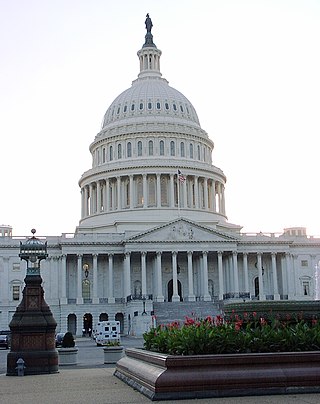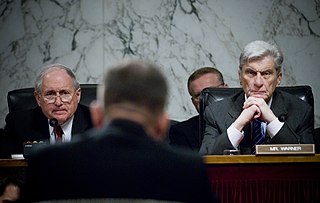
John Phillip Gingrey is an American physician and former politician who served as a U.S. Representative for Georgia's 11th congressional district from 2003 to 2015. He is a member of the Republican Party (GOP). His district comprised the northwestern suburbs of Atlanta. Since leaving Congress, Gingrey has worked as a senior adviser at the District Policy Group in Washington, D.C., which is the lobbying arm of the Drinker Biddle law firm.

The 106th United States Congress was a meeting of the legislative branch of the United States federal government, composed of the United States Senate and the United States House of Representatives. It met in Washington, D.C., from January 3, 1999, to January 3, 2001, during the last two years of Bill Clinton's presidency. The apportionment of seats in the House of Representatives was based on the 1990 United States census. Both chambers maintained a Republican majority.

A congressional committee is a legislative sub-organization in the United States Congress that handles a specific duty. Committee membership enables members to develop specialized knowledge of the matters under their jurisdiction. As "little legislatures", the committees monitor ongoing governmental operations, identify issues suitable for legislative review, gather and evaluate information, and recommend courses of action to their parent body. Woodrow Wilson once wrote, "it is not far from the truth to say that Congress in session is Congress on public exhibition, whilst Congress in its committee rooms is Congress at work." It is not expected that a member of Congress be an expert on all matters and subject areas that come before Congress. Congressional committees provide valuable informational services to Congress by investigating and reporting about specialized subjects.

The Committee on Oversight and Accountability is the main investigative committee of the United States House of Representatives.

The United States House Committee on House Administration deals with the general administration matters of the United States House of Representatives, the security of the United States Capitol, and federal elections.
Congressional oversight is oversight by the United States Congress over the executive branch, including the numerous U.S. federal agencies. Congressional oversight includes the review, monitoring, and supervision of federal agencies, programs, activities, and policy implementation. Congress exercises this power largely through its congressional committee system. Oversight also occurs in a wide variety of congressional activities and contexts. These include authorization, appropriations, investigative, and legislative hearings by standing committees; which is specialized investigations by select committees; and reviews and studies by congressional support agencies and staff.

The United States House Committee on Small Business is a standing committee of the United States House of Representatives. It was established in 1941 as the House Select Committee on Small Business.
The Science Subcommittee on Technology is one of six subcommittees of the United States House Committee on Science and Technology.

John Emerson Moss was an American politician of the Democratic Party, noted for his championing of the federal Freedom of Information Act (FOIA) through multiple sessions of the United States House of Representatives where he served from 1953 to 1978.
The Administrative Law, Process and Procedure Project is a bipartisan undertaking of the Committee on the Judiciary of the House of Representatives of the United States Congress. It consists of a comprehensive study of the state of administrative law, process and procedure in the United States. A description of the Project was included in the Judiciary Committee's Oversight Plan for the 109th Congress, as approved by the Committee on January 26, 2005. The Project will culminate with the preparation of a detailed report with recommendations for legislative proposals and suggested areas for further research and analysis to be considered by the Administrative Conference of the United States (ACUS). House Judiciary Committee Chairman F. James Sensenbrenner, Jr. (R-WI) and Ranking Member John Conyers (D-MI) requested the Congressional Research Service (CRS) to assist Representative Chris Cannon (R-UT), the Chairman of the Subcommittee on Commercial and Administrative Law (CAL), in conducting the Project.

The Regulatory Flexibility Act (RFA) is perhaps the most comprehensive effort by the U.S. federal government to balance the social goals of federal regulations with the needs and capabilities of small businesses and other small entities in American society.
The U.S. Senate Environment and Public Works Subcommittee on Chemical Safety, Waste Management, Environmental Justice and Regulatory Oversight is one a subcommittee of the U.S. Senate Committee on Environment and Public Works.
The Subcommittee on Government Operations and Border Management is one of the four subcommittees within the Senate Committee on Homeland Security and Governmental Affairs. It was known in previous Congresses as the Subcommittee on Regulatory Affairs and Federal Management

The Dodd–Frank Wall Street Reform and Consumer Protection Act, commonly referred to as Dodd–Frank, is a United States federal law that was enacted on July 21, 2010. The law overhauled financial regulation in the aftermath of the Great Recession, and it made changes affecting all federal financial regulatory agencies and almost every part of the nation's financial services industry.

The Department of Defense Office of Inspector General is an independent, objective agency that provides oversight related to the programs and operations of the United States Department of Defense (DoD). DoD IG was created in 1982 as an amendment to the Inspector General Act of 1978.

The Financial Stability Oversight Council (FSOC) is a United States federal government organization, established by Title I of the Dodd–Frank Wall Street Reform and Consumer Protection Act, which was signed into law by President Barack Obama on July 21, 2010. The Office of Financial Research is intended to provide support to the council.

The All Circuit Review Extension Act is an Act that extended for three years the authority for federal employees who appeal a judgment of the Merit Systems Protection Board (MSPB) to file their appeal at any federal court, instead of only the U.S. Court of Appeals. This was a pilot program established in the Whistleblower Protection Enhancement Act of 2012 to last only two years.

The Reducing Regulatory Burdens Act of 2013 is a bill that would prohibit the Environmental Protection Agency (EPA) and states authorized to issue a permit under the National Pollutant Discharge Elimination System (NPDES) from requiring a permit for some discharges of pesticides authorized for use under the Federal Insecticide, Fungicide, and Rodenticide Act (FIFRA). The bill would clarify the law so that people did not have to get two permits in order to use the same pesticide.
The Subcommittee on Economic Growth, Energy Policy and Regulatory Affairs is a subcommittee within the United States House Committee on Oversight and Government Reform. It was previously known as the Subcommittee on Economic and Consumer Policy.
The United States House Select Subcommittee on the Coronavirus Pandemic, formerly the Select Subcommittee on the Coronavirus Crisis, is a bipartisan United States House of Representatives select subcommittee that was created to provide congressional oversight of the Trump administration's response to the COVID-19 pandemic in the United States. The Select Subcommittee was established under H.Res.935 during the 116th Congress. Speaker Nancy Pelosi announced on April 2, 2020, that the committee would oversee the $2.2 trillion economic stimulus/rescue legislation enacted by Congress. The Act created a $500 billion bailout fund for U.S. industry and is the largest economic emergency legislation in U.S. history. It was established as a special investigatory subcommittee under the House Oversight Committee.







